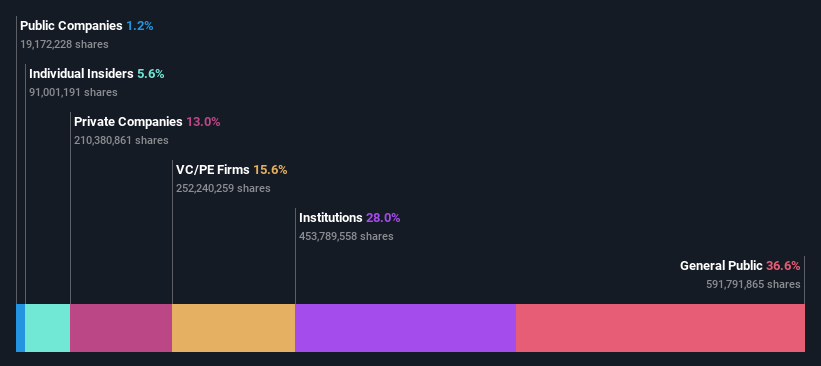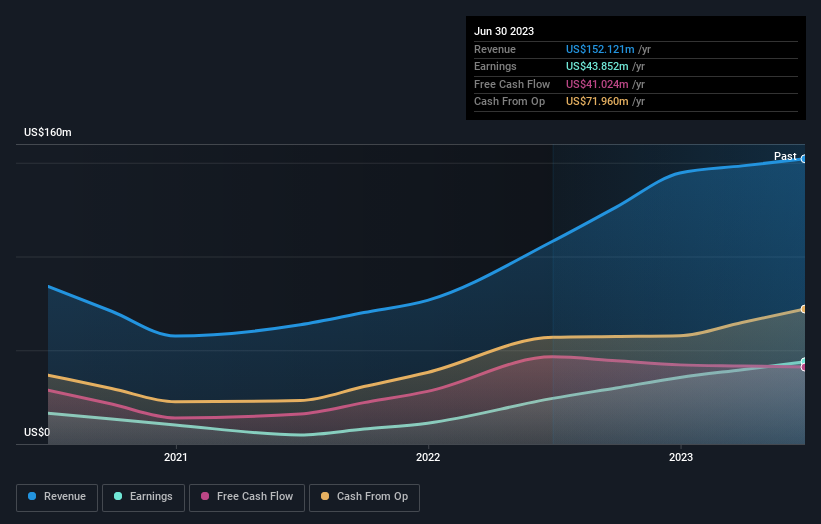Stock Analysis
- Australia
- /
- Oil and Gas
- /
- ASX:HZN
Horizon Oil Limited's (ASX:HZN) 14% loss last week hit both individual investors who own 37% as well as institutions

Key Insights
- Significant control over Horizon Oil by individual investors implies that the general public has more power to influence management and governance-related decisions
- A total of 4 investors have a majority stake in the company with 51% ownership
- Institutions own 28% of Horizon Oil
To get a sense of who is truly in control of Horizon Oil Limited (ASX:HZN), it is important to understand the ownership structure of the business. And the group that holds the biggest piece of the pie are individual investors with 37% ownership. Put another way, the group faces the maximum upside potential (or downside risk).
Following a 14% decrease in the stock price last week, individual investors suffered the most losses, but institutions who own 28% stock also took a hit.
In the chart below, we zoom in on the different ownership groups of Horizon Oil.
View our latest analysis for Horizon Oil

What Does The Institutional Ownership Tell Us About Horizon Oil?
Institutional investors commonly compare their own returns to the returns of a commonly followed index. So they generally do consider buying larger companies that are included in the relevant benchmark index.
As you can see, institutional investors have a fair amount of stake in Horizon Oil. This suggests some credibility amongst professional investors. But we can't rely on that fact alone since institutions make bad investments sometimes, just like everyone does. If multiple institutions change their view on a stock at the same time, you could see the share price drop fast. It's therefore worth looking at Horizon Oil's earnings history below. Of course, the future is what really matters.

We note that hedge funds don't have a meaningful investment in Horizon Oil. The company's largest shareholder is Samuel Terry Asset Management Pty Ltd, with ownership of 19%. Meanwhile, the second and third largest shareholders, hold 16% and 9.2%, of the shares outstanding, respectively. Furthermore, CEO Richard Beament is the owner of 0.7% of the company's shares.
On looking further, we found that 51% of the shares are owned by the top 4 shareholders. In other words, these shareholders have a meaningful say in the decisions of the company.
While studying institutional ownership for a company can add value to your research, it is also a good practice to research analyst recommendations to get a deeper understand of a stock's expected performance. As far as we can tell there isn't analyst coverage of the company, so it is probably flying under the radar.
Insider Ownership Of Horizon Oil
While the precise definition of an insider can be subjective, almost everyone considers board members to be insiders. Management ultimately answers to the board. However, it is not uncommon for managers to be executive board members, especially if they are a founder or the CEO.
Most consider insider ownership a positive because it can indicate the board is well aligned with other shareholders. However, on some occasions too much power is concentrated within this group.
Our most recent data indicates that insiders own some shares in Horizon Oil Limited. It has a market capitalization of just AU$251m, and insiders have AU$14m worth of shares, in their own names. It is good to see some investment by insiders, but we usually like to see higher insider holdings. It might be worth checking if those insiders have been buying.
General Public Ownership
The general public-- including retail investors -- own 37% stake in the company, and hence can't easily be ignored. This size of ownership, while considerable, may not be enough to change company policy if the decision is not in sync with other large shareholders.
Private Equity Ownership
Private equity firms hold a 16% stake in Horizon Oil. This suggests they can be influential in key policy decisions. Some investors might be encouraged by this, since private equity are sometimes able to encourage strategies that help the market see the value in the company. Alternatively, those holders might be exiting the investment after taking it public.
Private Company Ownership
We can see that Private Companies own 13%, of the shares on issue. It's hard to draw any conclusions from this fact alone, so its worth looking into who owns those private companies. Sometimes insiders or other related parties have an interest in shares in a public company through a separate private company.
Next Steps:
While it is well worth considering the different groups that own a company, there are other factors that are even more important. To that end, you should be aware of the 1 warning sign we've spotted with Horizon Oil .
Of course this may not be the best stock to buy. So take a peek at this free free list of interesting companies.
NB: Figures in this article are calculated using data from the last twelve months, which refer to the 12-month period ending on the last date of the month the financial statement is dated. This may not be consistent with full year annual report figures.
Valuation is complex, but we're helping make it simple.
Find out whether Horizon Oil is potentially over or undervalued by checking out our comprehensive analysis, which includes fair value estimates, risks and warnings, dividends, insider transactions and financial health.
View the Free AnalysisHave feedback on this article? Concerned about the content? Get in touch with us directly. Alternatively, email editorial-team (at) simplywallst.com.
This article by Simply Wall St is general in nature. We provide commentary based on historical data and analyst forecasts only using an unbiased methodology and our articles are not intended to be financial advice. It does not constitute a recommendation to buy or sell any stock, and does not take account of your objectives, or your financial situation. We aim to bring you long-term focused analysis driven by fundamental data. Note that our analysis may not factor in the latest price-sensitive company announcements or qualitative material. Simply Wall St has no position in any stocks mentioned.
About ASX:HZN
Horizon Oil
Horizon Oil Limited, together with its subsidiaries, engages in the exploration, development, and production of oil and gas properties in China and New Zealand.
Outstanding track record with flawless balance sheet and pays a dividend.

